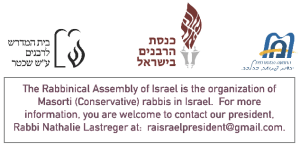
![]()
In the Torah reading Yitro, Moshe’s father-in-law advises him to appoint judges to meet the people’s needs for justice. This precedes the giving of the Torah itself. A functioning legal system is a prerequisite for any just, decent, human society. It is no coincidence that this requirement appeared as one of the seven Noahide laws at the beginning of the Torah narrative.
You shall also seek out, from among all the people, capable individuals (Anshei Hayil) who fear God — trustworthy ones who spurn ill-gotten gain. (Exodus, 19, 21-22)
Moses heeded his father-in-law and chose capable individuals (Anshei Hayil) …
… They judged the people at all times (Ex. 23-25) Rashi (11th c. France) interprets “Anshei Hayil” as meaning wealthy individuals not dependent on others, Ibn Ezra (12th c. Spain) emphasized “Godfearing” i.e. that judges should not fear their fellow men. Ramban (13th c. Spain) focused on the quality of hatred of economic corruption and exploitation.
They all have in common the standard that judges should function independently of political power and stand up strongly in their pursuit of justice.
![]()
